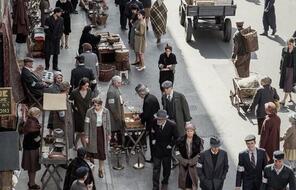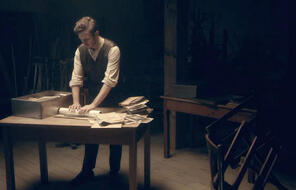The Night of the Pogrom (Abridged)
At a Glance
Language
English — USSubject
- History
- The Holocaust
Hugo Moses described what he experienced on Kristallnacht and in the days that followed:
On the evening of 9 November 1938, the SA brown-shirts and the SS black-shirts met in bars to celebrate the fifteenth anniversary of [the Nazis’] failed putsch in Munich. Around eleven o’clock in the evening, I came home from a Jewish aid organization meeting and I can testify that most of the “German people” who a day later the government said were responsible for what happened that night lay peacefully in bed that evening. Everywhere lights had been put out, and nothing suggested that in the following hours such terrible events would take place.
Even the uniformed party members were not in on the plan; the order to destroy Jewish property came shortly before they moved from the bars to the Jewish houses. (I have this information from the brother of an SS man who took an active part in the pogroms.)
At 3 a.m. sharp, someone insistently rang at the door to my apartment. I went to the window and saw that the streetlights had been turned off. Nonetheless, I could make out a transport vehicle out of which emerged about twenty uniformed men. I recognized only one of them, a man who served as the leader; the rest came from other localities and cities and were distributed over the district in accordance with marching orders. I called out to my wife: “Don’t be afraid, they are party men; please keep calm.” Then I went to the door in my pajamas and opened it.
A wave of alcohol hit me, and the mob forced its way into the home. A leader pushed by me and yanked the telephone off the wall. A leader of the SS men, green-faced with drunkenness, cocked his revolver as I watched and then held it to my forehead and slurred: “Do you know why we’ve come here, you swine?” I replied, “No,” and he went on, “Because of the outrageous act committed in Paris, for which you are also to blame. If you even try to move, I’ll shoot you like a pig.” I kept quiet and stood, my hands behind my back, in the ice-cold [draft] coming in the open door. An SA man, who must have had a little human feeling, whispered to me: “Keep still. Don’t move.” During all this time and for another twenty minutes, the drunken SS leader fumbled threateningly with his revolver near my forehead. An inadvertent movement on my part or a clumsy one on his and my life would have been over. If I live to be a hundred, I will never forget that brutish face and those dreadful minutes.
In the meantime, about ten uniformed men had invaded my house. I heard my wife cry: “What do you want with my children? You’ll touch the children over my dead body!” Then I heard only the crashing of overturned furniture, the breaking of glass and the trampling of heavy boots. Weeks later, I was still waking from restless sleep, still hearing that crashing, hammering, and striking. We will never forget that night. After about half an hour, which seemed to me an eternity, the brutish drunks left our apartment, shouting and bellowing. The leader blew a whistle and as his subordinates stumbled past him, fired his revolver close to my head, two shots to the ceiling. I thought my eardrums had burst but I stood there like a wall. (A few hours later I showed a police officer the two bullet holes.) The last SA man who left the building hit me on the head so hard with the walking stick he had used to destroy my pictures that a fortnight later the swelling was still perceptible. As he went out, he shouted at me: “There you are, you Jewish pig. Have fun.” . . .
Towards dawn, a police officer appeared in order to determine whether there was any damage visible from the outside, such as broken window glass or furniture thrown out into the street. Shaking his head, he said to us, as I showed him the bullet holes from the preceding night: “It’s a disgrace to see all this. It wouldn’t have happened if we hadn’t had to stay in our barracks.” As he left, the officer said, “I hope it’s the last time this will happen to you.”
Two hours later, another police officer appeared and told Moses, “I’m sorry, but I have to arrest you.”
I said to him, “I have never broken the law; tell me why you are arresting me.” The officer: “I have been ordered to arrest all Jewish men. Don’t make it so hard for me, just follow me.” My wife accompanied me to the police station. . . .
At the police station, the officers were almost all nice to us. Only one officer told my wife: “Go home. You may see your husband again after a few years of forced labor in the concentration camp, if he’s still alive.” Another officer, who had been at school with me, said to his comrade: “Man, don’t talk such nonsense.” To my wife he said: “Just go home now, you’ll soon have your husband back.” A few hours later my little boy came to see me again. The experiences of that terrible night and my arrest were too much for the little soul, and he kept weeping and looking at me as if I were about to be shot. The police officer I knew well took the child by the hand and said to me: “I’ll take the child to my office until you are taken away. If the boy saw that, he’d never forget it for the rest of his life.” 1
After several weeks in prison, Moses was released, thanks to the wife of an “Aryan” acquaintance. Soon after, he and his family managed to leave Germany. Moses told his story for the first time in 1940, just a year and a half after the pogrom. He refused to reveal the name of his town or the identities of those who helped him, because he did not want to endanger those left behind.
Connection Questions
- What did Jews in Germany experience during and immediately after Kristallnacht? What do you imagine other Germans would have seen and experienced that night?
- What choices did Germans face on the night of Kristallnacht? What choices did they face in its aftermath?
- To what extent was Kristallnacht similar to what had come before? How was Kristallnacht different?
- Why would the Nazis use the murder of one man in Paris to incite violence against an entire group in Germany?
- 1Uta Gerhardt and Thomas Karlauf, eds., The Night of Broken Glass: Eyewitness Accounts of Kristallnacht (Cambridge, UK: Polity Press, 2012), 21–23. Reproduced by permission from Polity Press.
How to Cite This Reading
Facing History & Ourselves, "The Night of the Pogrom," last updated March 12, 2018.








